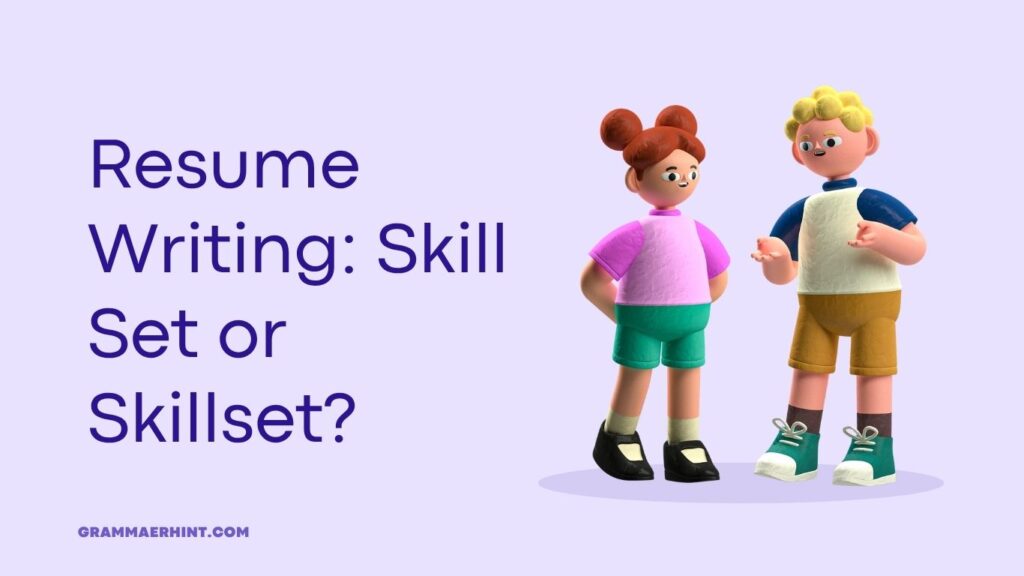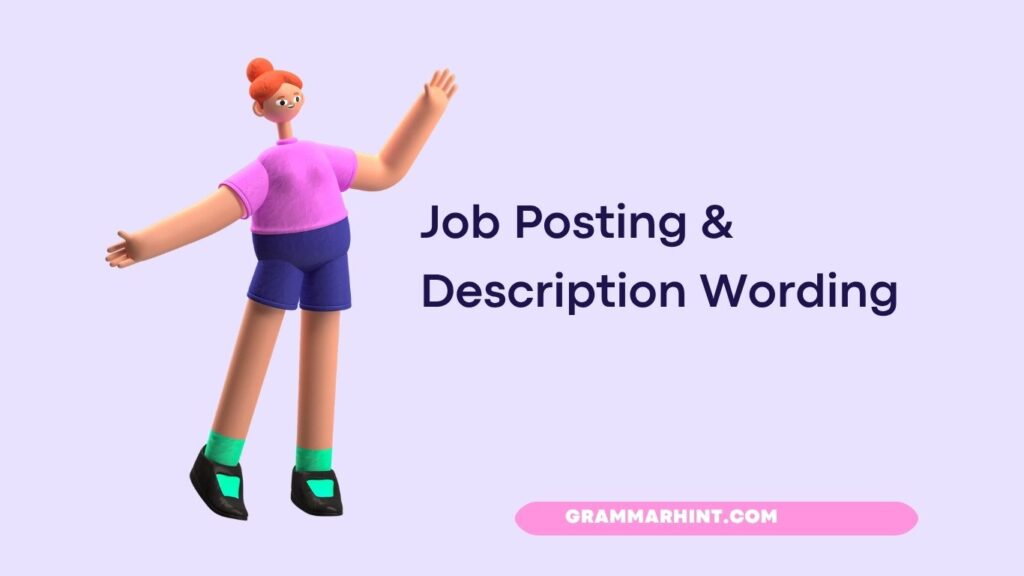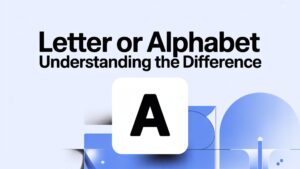When you’re writing a resume, composing a job posting, or crafting a professional email, the way you write certain terms can influence how polished and credible you sound. One term that frequently causes confusion is “skill set”. Should it be “Skill Set”, “Skillset”, or “Skill-Set”?
Understanding the difference isn’t just about grammar it’s about following professional writing standards, improving clarity and readability, and ensuring you’re aligned with what your audience expects. In other words, your choice can shape how your communication is perceived.
What is a Skill Set?
In plain terms, a skill set is a collection of competencies, proficiencies, or expertise areas someone possesses to perform specific tasks. These can be technical, interpersonal, or conceptual.
Examples of common skill sets include:
- Programming
- Leadership
- Project management
- Writing
- Data analysis
This form—“skill set” written as two words—is favored by most grammar and style guides, such as the AP Stylebook, Chicago Manual of Style, and even the Merriam-Webster Dictionary. Therefore, using this form ensures adherence to professional standards.
Email Scenario Example:
Hi Jonathan,
We’re reviewing applicants who bring a diverse skill set to the table, especially in digital marketing and analytics. Could you please share your updated resume?
Thanks, Maria
Is Skillset One Word?
This question pops up a lot: “Is skillset one word or two?” Technically, “skillset” is becoming an accepted variant in informal writing and digital spaces. Still, the traditional form remains more widely accepted in professional environments.
According to dictionary standards, the majority still consider “skillset” nonstandard. However, some dictionaries like Collins and Cambridge have started acknowledging it as a colloquial or modern term. As language evolves, so too do certain spellings—but professional usage tends to lag behind casual trends.
Search Query Trends (Google Trends):
Google Trends data reveals a growing number of users searching “is skillset a word” and “skill set or skillset” over the past five years, indicating growing uncertainty and usage shift.
Social Media Analysis:
Platforms like LinkedIn and Twitter show a mixed bag—recruiters often use “skill set”, while job seekers lean toward “skillset”, perhaps aiming for conciseness. Even so, clarity should always come first.
Skill-Set: The Hyphenated Form
Is there a case for using “Skill-Set”? Maybe stylistically—but rarely grammatically. When it comes to professional writing, clarity and convention win out.
The hyphenated version Skill-Set is generally not supported by style guides or dictionaries. It appears occasionally in British English documents or old publications but has largely fallen out of favor.
Grammar and Style Guides:
- The AP Stylebook avoids unnecessary hyphenation unless clarity is impacted.
- Chicago Manual of Style reserves hyphenated forms for compound adjectives before nouns (e.g., “high-quality work”).
- Style guide recommendations suggest avoiding “skill-set” unless it’s part of a brand name or product.
Example:
Incorrect: She has a broad skill-set in IT. Correct: She has a broad skill set in IT.
Compound Nouns: Open, Closed, and Hyphenated Forms
Understanding the nature of compound nouns is key to choosing the right format. Let’s break it down for easier comparison.
| Type | Example | Explanation |
|---|---|---|
| Open Compound | skill set | Written as two separate words |
| Closed Compound | skillset | Written as a single word (rarely correct) |
| Hyphenated Compound | skill-set | Uses a hyphen (typically avoided) |
In professional communication standards, the open compound form—skill set—is considered the correct usage.
Proper use of compound nouns involves knowing when to hyphenate and when to keep words open. The right form ensures your writing remains polished and easy to follow.
Why Does the Right Form Matter?
Using the right form shows attention to writing standards, enhances communication clarity, and aligns with expectations in business English. More importantly, it reflects your professionalism.
Inaccurate use could be interpreted as carelessness or a lack of attention to detail—especially in resume writing, job posting, or formal documents.
Email Example:
Hi Rachel,
We noticed a few inconsistencies in the language used. For example, “skillset” should be written as “skill set” based on our style guide standards. Please revise accordingly before publishing.
Best, Derek
Resume Writing: Skill Set or Skillset?

For anyone crafting a resume, this part is crucial. Your resume should reflect your grasp of professional communication standards.
Use “skill set”—the open compound—in all your headings, summaries, and lists.
Resume Example:
Skill Set
- SEO and Google Analytics
- Technical Writing
- Content Strategy
- CMS Management
Using “skillset” might not tank your application, but it may slightly affect resume optimization if recruiters or applicant tracking systems favor the traditional form. To be safe, always go with the correct usage.
How to Use Skill Set in a Sentence
Let’s look at how to use skill set in a sentence correctly:
- “Her skill set in customer service and negotiation is exceptional.”
- “We’re looking for someone with a skill set in data engineering.”
- “The job description lists a variety of competencies and a strong skill set in product development.”
Incorrect: “He has a diverse skillset in software engineering.”
Correct: “He has a diverse skill set in software engineering.”
Formal vs Informal Writing Terms
- In formal writing (academic papers, corporate communications, manuals), use “skill set”.
- In informal writing (blogs, emails, casual conversations), some writers use “skillset” without backlash, though it’s not technically correct.
Business Writing Tips: Always lean toward clarity. When you’re unsure, defer to professional style guides for guidance.
Regional Preferences: British vs American English Grammar
British vs American English grammar can occasionally differ in how compound nouns are treated.
- In American English, the open compound “skill set” is standard.
- In some UK publications, you might occasionally see “skill-set”, though it’s less common today.
Nevertheless, American usage is more dominant in international business writing.
Terminology in Business English
Let’s look at terminology in business English where the nuances of word choice matter:
- Skills vs Qualifications: Skills are part of a skill set; qualifications are often credentials or experiences.
- Proficiencies vs Expertise: Proficiencies are measurable abilities, while expertise suggests mastery.
- Competencies: These encompass a blend of knowledge, skills, and abilities critical for a role.
List of Proficiencies:
- Budgeting
- Conflict resolution
- Data entry
- Multilingual communication
Job Posting & Description Wording

When writing a job posting, using the correct form can improve both clarity and SEO. Remember, job listings should be clear and easy to scan.
We’re seeking a candidate with a proven skill set in CRM management, customer retention, and technical troubleshooting.
Avoid using “skillset” in this context to maintain professional credibility and correct compound nouns examples.
Job description wording tip: Always ensure consistent terminology throughout the post. This helps the reader navigate the listing more efficiently.
Trends in Job Market Terminology
Trends in job market terminology are shifting. However, just because something is trending doesn’t make it correct.
- Google Trends indicates rising searches for “is it skillset or skill set”.
- Recruiters on LinkedIn often correct resumes that use “skillset” in favor of “skill set”.
Public perception still favors clarity and correctness. It’s a reminder that precision often trumps popularity.
Final Word: Choose Clarity, Not Confusion
So, what’s the final verdict?
- Correct usage: Skill set (two words)
- Avoid: “Skillset” and “Skill-Set” in formal or professional contexts
- Why? It aligns with standard writing practices, ensures communication clarity, and meets professional communication standards
Synonyms for skills: expertise, talents, capabilities, abilities, strengths
Stick to what’s clear, correct, and widely accepted. Whether you’re aiming for career advancement, refining a resume, or writing a business proposal, choosing the right form shows attention to detail and mastery of business writing tips.
TL;DR (Too Long; Didn’t Read)
| Format | Correct? | Context | Notes |
| Skill Set | ✅ Yes | Formal & professional | Preferred by all major style guides |
| Skillset | ❌ No | Informal, digital | Increasingly used but not standard |
| Skill-Set | ❌ No | Obsolete | Rare, mostly stylistic, not used in professional writin |









